Leadership in Business: A Reflective Analysis of Leadership Theories
VerifiedAdded on 2023/06/09
|8
|2245
|236
Essay
AI Summary
This essay is a reflective account of the author's experiences as a customer service manager in a manpower-based security agency, focusing on the development and application of leadership skills. It explores leadership through the lens of trait theory and behavioral theory, comparing and contrasting these approaches. The author discusses the importance of acquiring leadership skills and the intention to incorporate situational leadership and emotional intelligence in future leadership roles. The essay concludes that effective leadership involves a combination of various theories and a commitment to continuous development to achieve organizational success. Desklib provides access to similar essays and study resources for students.
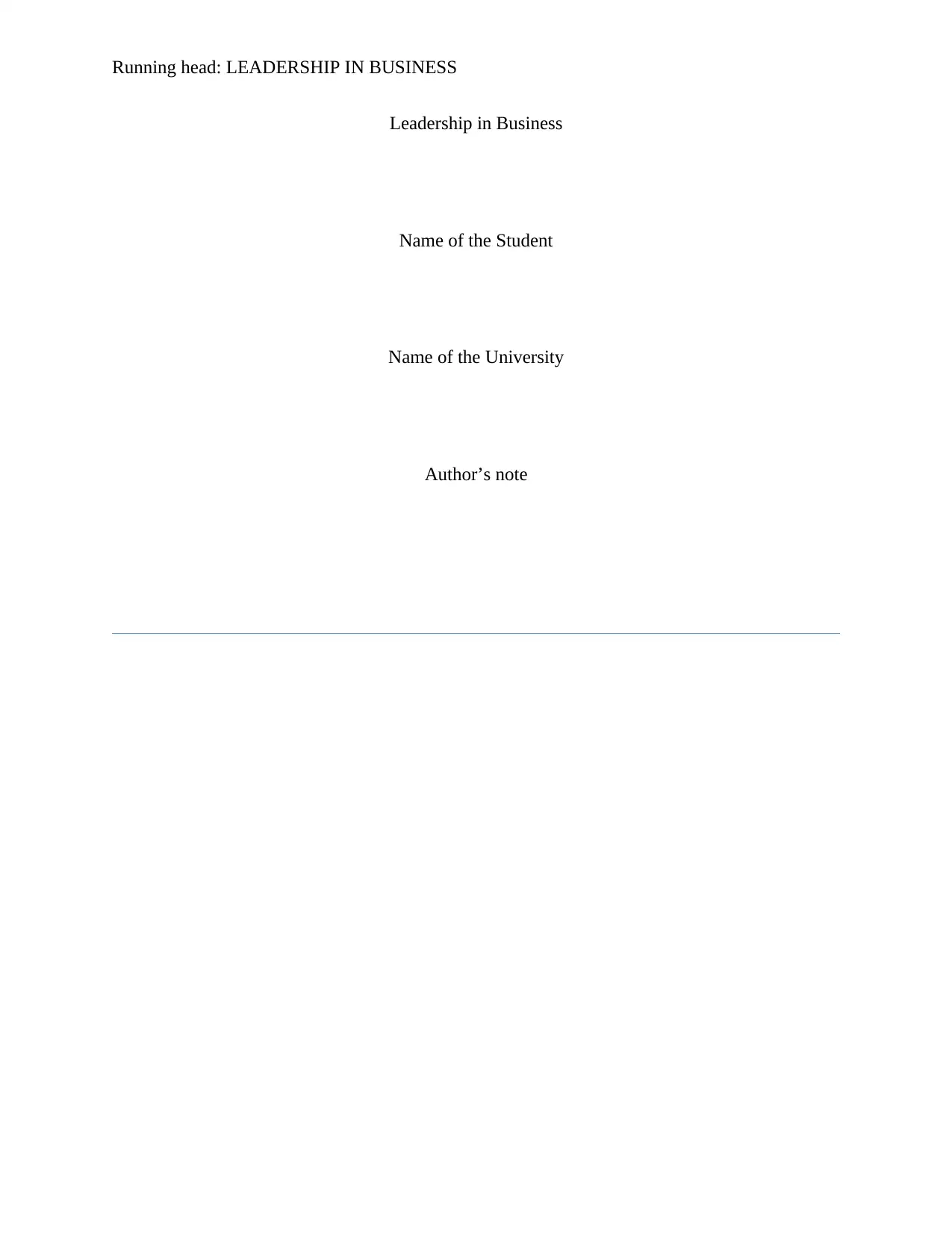
Running head: LEADERSHIP IN BUSINESS
Leadership in Business
Name of the Student
Name of the University
Author’s note
Leadership in Business
Name of the Student
Name of the University
Author’s note
Paraphrase This Document
Need a fresh take? Get an instant paraphrase of this document with our AI Paraphraser
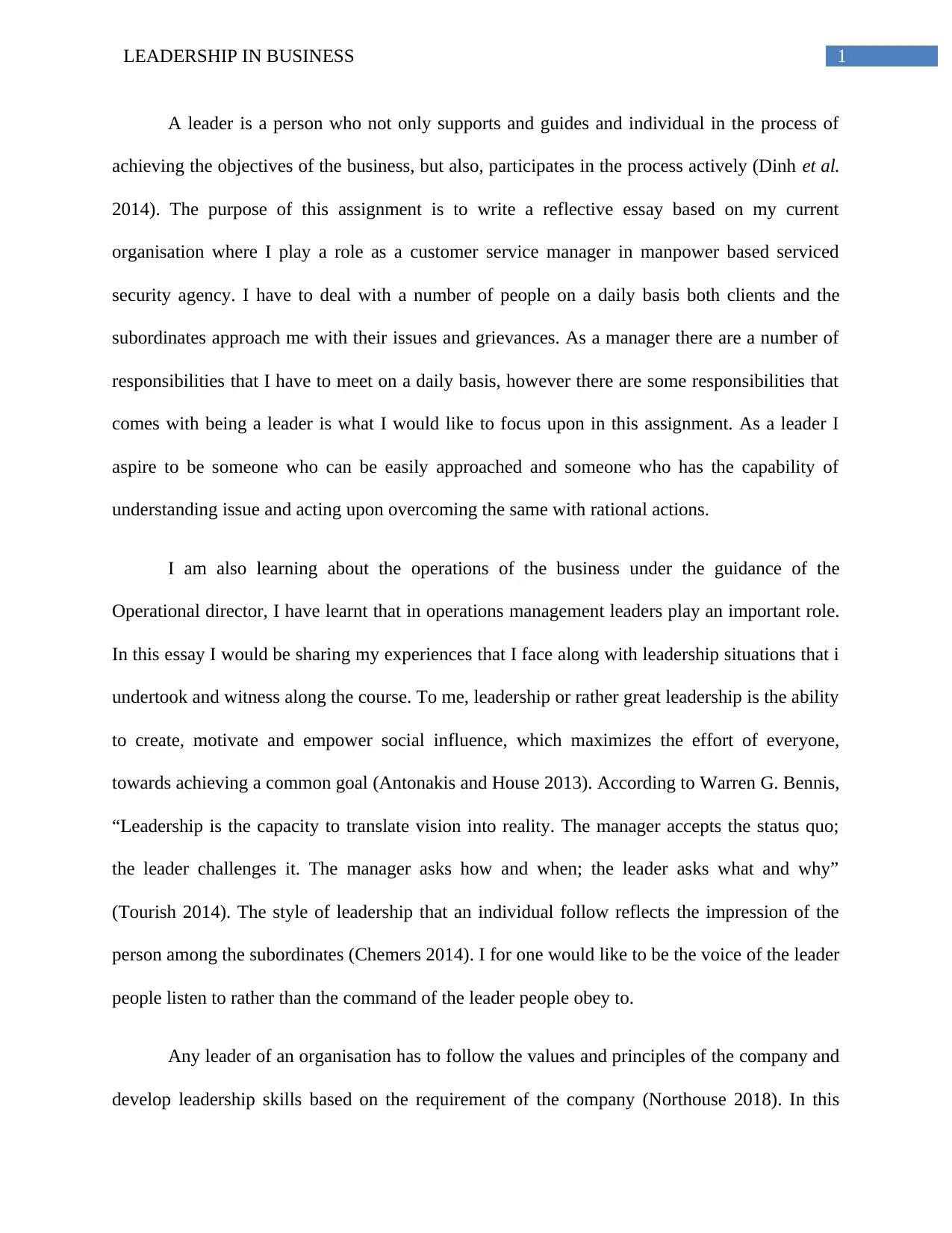
1LEADERSHIP IN BUSINESS
A leader is a person who not only supports and guides and individual in the process of
achieving the objectives of the business, but also, participates in the process actively (Dinh et al.
2014). The purpose of this assignment is to write a reflective essay based on my current
organisation where I play a role as a customer service manager in manpower based serviced
security agency. I have to deal with a number of people on a daily basis both clients and the
subordinates approach me with their issues and grievances. As a manager there are a number of
responsibilities that I have to meet on a daily basis, however there are some responsibilities that
comes with being a leader is what I would like to focus upon in this assignment. As a leader I
aspire to be someone who can be easily approached and someone who has the capability of
understanding issue and acting upon overcoming the same with rational actions.
I am also learning about the operations of the business under the guidance of the
Operational director, I have learnt that in operations management leaders play an important role.
In this essay I would be sharing my experiences that I face along with leadership situations that i
undertook and witness along the course. To me, leadership or rather great leadership is the ability
to create, motivate and empower social influence, which maximizes the effort of everyone,
towards achieving a common goal (Antonakis and House 2013). According to Warren G. Bennis,
“Leadership is the capacity to translate vision into reality. The manager accepts the status quo;
the leader challenges it. The manager asks how and when; the leader asks what and why”
(Tourish 2014). The style of leadership that an individual follow reflects the impression of the
person among the subordinates (Chemers 2014). I for one would like to be the voice of the leader
people listen to rather than the command of the leader people obey to.
Any leader of an organisation has to follow the values and principles of the company and
develop leadership skills based on the requirement of the company (Northouse 2018). In this
A leader is a person who not only supports and guides and individual in the process of
achieving the objectives of the business, but also, participates in the process actively (Dinh et al.
2014). The purpose of this assignment is to write a reflective essay based on my current
organisation where I play a role as a customer service manager in manpower based serviced
security agency. I have to deal with a number of people on a daily basis both clients and the
subordinates approach me with their issues and grievances. As a manager there are a number of
responsibilities that I have to meet on a daily basis, however there are some responsibilities that
comes with being a leader is what I would like to focus upon in this assignment. As a leader I
aspire to be someone who can be easily approached and someone who has the capability of
understanding issue and acting upon overcoming the same with rational actions.
I am also learning about the operations of the business under the guidance of the
Operational director, I have learnt that in operations management leaders play an important role.
In this essay I would be sharing my experiences that I face along with leadership situations that i
undertook and witness along the course. To me, leadership or rather great leadership is the ability
to create, motivate and empower social influence, which maximizes the effort of everyone,
towards achieving a common goal (Antonakis and House 2013). According to Warren G. Bennis,
“Leadership is the capacity to translate vision into reality. The manager accepts the status quo;
the leader challenges it. The manager asks how and when; the leader asks what and why”
(Tourish 2014). The style of leadership that an individual follow reflects the impression of the
person among the subordinates (Chemers 2014). I for one would like to be the voice of the leader
people listen to rather than the command of the leader people obey to.
Any leader of an organisation has to follow the values and principles of the company and
develop leadership skills based on the requirement of the company (Northouse 2018). In this
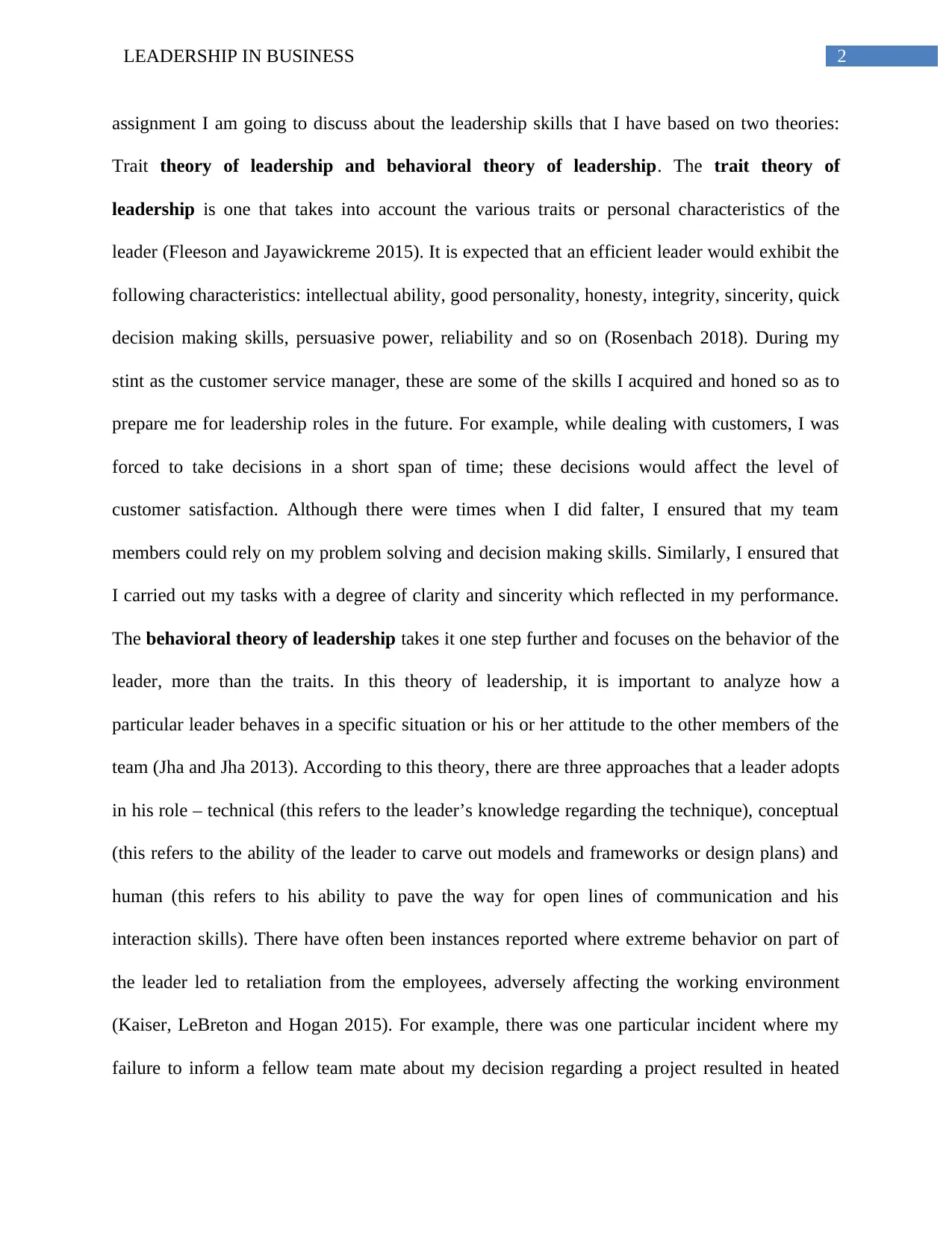
2LEADERSHIP IN BUSINESS
assignment I am going to discuss about the leadership skills that I have based on two theories:
Trait theory of leadership and behavioral theory of leadership. The trait theory of
leadership is one that takes into account the various traits or personal characteristics of the
leader (Fleeson and Jayawickreme 2015). It is expected that an efficient leader would exhibit the
following characteristics: intellectual ability, good personality, honesty, integrity, sincerity, quick
decision making skills, persuasive power, reliability and so on (Rosenbach 2018). During my
stint as the customer service manager, these are some of the skills I acquired and honed so as to
prepare me for leadership roles in the future. For example, while dealing with customers, I was
forced to take decisions in a short span of time; these decisions would affect the level of
customer satisfaction. Although there were times when I did falter, I ensured that my team
members could rely on my problem solving and decision making skills. Similarly, I ensured that
I carried out my tasks with a degree of clarity and sincerity which reflected in my performance.
The behavioral theory of leadership takes it one step further and focuses on the behavior of the
leader, more than the traits. In this theory of leadership, it is important to analyze how a
particular leader behaves in a specific situation or his or her attitude to the other members of the
team (Jha and Jha 2013). According to this theory, there are three approaches that a leader adopts
in his role – technical (this refers to the leader’s knowledge regarding the technique), conceptual
(this refers to the ability of the leader to carve out models and frameworks or design plans) and
human (this refers to his ability to pave the way for open lines of communication and his
interaction skills). There have often been instances reported where extreme behavior on part of
the leader led to retaliation from the employees, adversely affecting the working environment
(Kaiser, LeBreton and Hogan 2015). For example, there was one particular incident where my
failure to inform a fellow team mate about my decision regarding a project resulted in heated
assignment I am going to discuss about the leadership skills that I have based on two theories:
Trait theory of leadership and behavioral theory of leadership. The trait theory of
leadership is one that takes into account the various traits or personal characteristics of the
leader (Fleeson and Jayawickreme 2015). It is expected that an efficient leader would exhibit the
following characteristics: intellectual ability, good personality, honesty, integrity, sincerity, quick
decision making skills, persuasive power, reliability and so on (Rosenbach 2018). During my
stint as the customer service manager, these are some of the skills I acquired and honed so as to
prepare me for leadership roles in the future. For example, while dealing with customers, I was
forced to take decisions in a short span of time; these decisions would affect the level of
customer satisfaction. Although there were times when I did falter, I ensured that my team
members could rely on my problem solving and decision making skills. Similarly, I ensured that
I carried out my tasks with a degree of clarity and sincerity which reflected in my performance.
The behavioral theory of leadership takes it one step further and focuses on the behavior of the
leader, more than the traits. In this theory of leadership, it is important to analyze how a
particular leader behaves in a specific situation or his or her attitude to the other members of the
team (Jha and Jha 2013). According to this theory, there are three approaches that a leader adopts
in his role – technical (this refers to the leader’s knowledge regarding the technique), conceptual
(this refers to the ability of the leader to carve out models and frameworks or design plans) and
human (this refers to his ability to pave the way for open lines of communication and his
interaction skills). There have often been instances reported where extreme behavior on part of
the leader led to retaliation from the employees, adversely affecting the working environment
(Kaiser, LeBreton and Hogan 2015). For example, there was one particular incident where my
failure to inform a fellow team mate about my decision regarding a project resulted in heated
⊘ This is a preview!⊘
Do you want full access?
Subscribe today to unlock all pages.

Trusted by 1+ million students worldwide
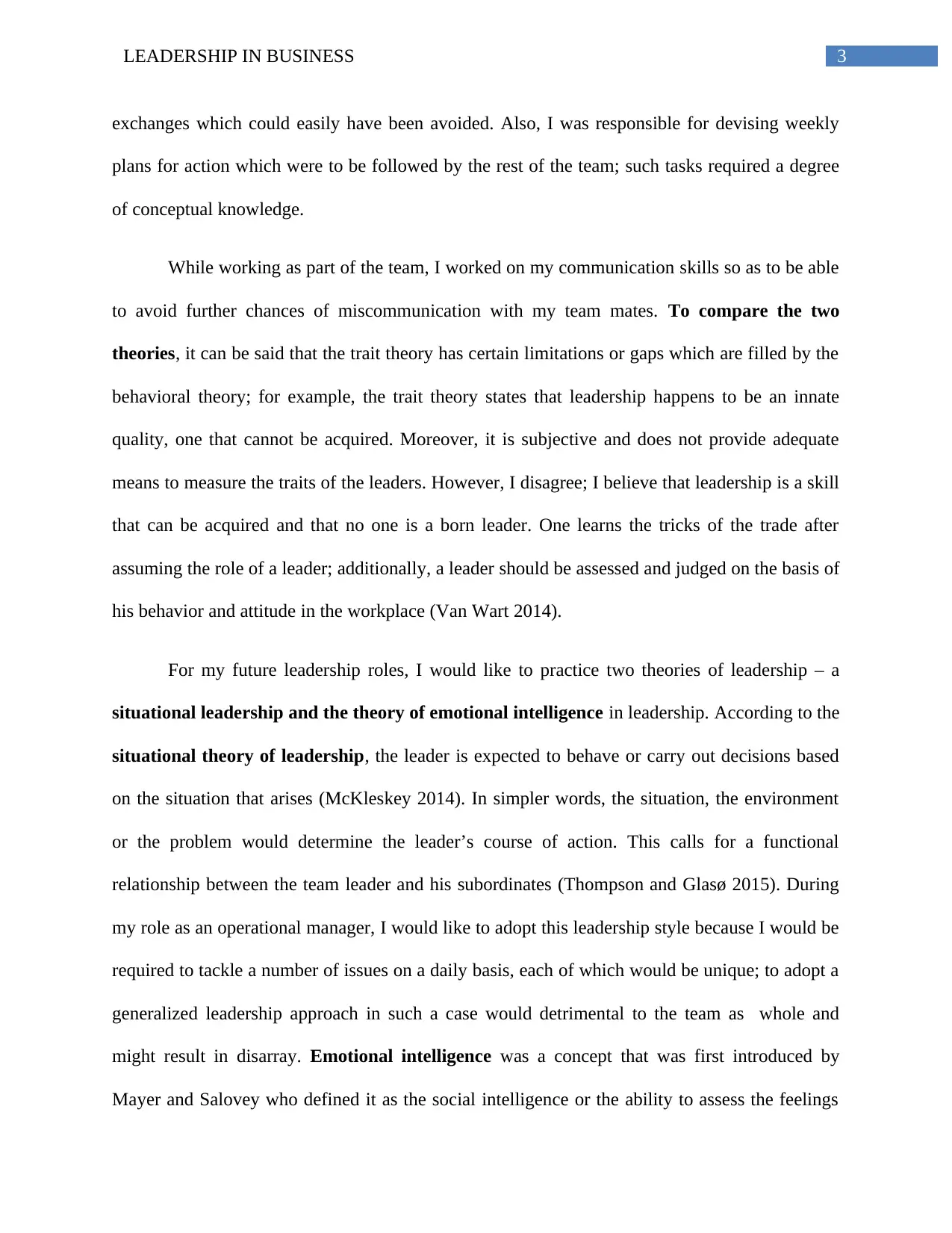
3LEADERSHIP IN BUSINESS
exchanges which could easily have been avoided. Also, I was responsible for devising weekly
plans for action which were to be followed by the rest of the team; such tasks required a degree
of conceptual knowledge.
While working as part of the team, I worked on my communication skills so as to be able
to avoid further chances of miscommunication with my team mates. To compare the two
theories, it can be said that the trait theory has certain limitations or gaps which are filled by the
behavioral theory; for example, the trait theory states that leadership happens to be an innate
quality, one that cannot be acquired. Moreover, it is subjective and does not provide adequate
means to measure the traits of the leaders. However, I disagree; I believe that leadership is a skill
that can be acquired and that no one is a born leader. One learns the tricks of the trade after
assuming the role of a leader; additionally, a leader should be assessed and judged on the basis of
his behavior and attitude in the workplace (Van Wart 2014).
For my future leadership roles, I would like to practice two theories of leadership – a
situational leadership and the theory of emotional intelligence in leadership. According to the
situational theory of leadership, the leader is expected to behave or carry out decisions based
on the situation that arises (McKleskey 2014). In simpler words, the situation, the environment
or the problem would determine the leader’s course of action. This calls for a functional
relationship between the team leader and his subordinates (Thompson and Glasø 2015). During
my role as an operational manager, I would like to adopt this leadership style because I would be
required to tackle a number of issues on a daily basis, each of which would be unique; to adopt a
generalized leadership approach in such a case would detrimental to the team as whole and
might result in disarray. Emotional intelligence was a concept that was first introduced by
Mayer and Salovey who defined it as the social intelligence or the ability to assess the feelings
exchanges which could easily have been avoided. Also, I was responsible for devising weekly
plans for action which were to be followed by the rest of the team; such tasks required a degree
of conceptual knowledge.
While working as part of the team, I worked on my communication skills so as to be able
to avoid further chances of miscommunication with my team mates. To compare the two
theories, it can be said that the trait theory has certain limitations or gaps which are filled by the
behavioral theory; for example, the trait theory states that leadership happens to be an innate
quality, one that cannot be acquired. Moreover, it is subjective and does not provide adequate
means to measure the traits of the leaders. However, I disagree; I believe that leadership is a skill
that can be acquired and that no one is a born leader. One learns the tricks of the trade after
assuming the role of a leader; additionally, a leader should be assessed and judged on the basis of
his behavior and attitude in the workplace (Van Wart 2014).
For my future leadership roles, I would like to practice two theories of leadership – a
situational leadership and the theory of emotional intelligence in leadership. According to the
situational theory of leadership, the leader is expected to behave or carry out decisions based
on the situation that arises (McKleskey 2014). In simpler words, the situation, the environment
or the problem would determine the leader’s course of action. This calls for a functional
relationship between the team leader and his subordinates (Thompson and Glasø 2015). During
my role as an operational manager, I would like to adopt this leadership style because I would be
required to tackle a number of issues on a daily basis, each of which would be unique; to adopt a
generalized leadership approach in such a case would detrimental to the team as whole and
might result in disarray. Emotional intelligence was a concept that was first introduced by
Mayer and Salovey who defined it as the social intelligence or the ability to assess the feelings
Paraphrase This Document
Need a fresh take? Get an instant paraphrase of this document with our AI Paraphraser
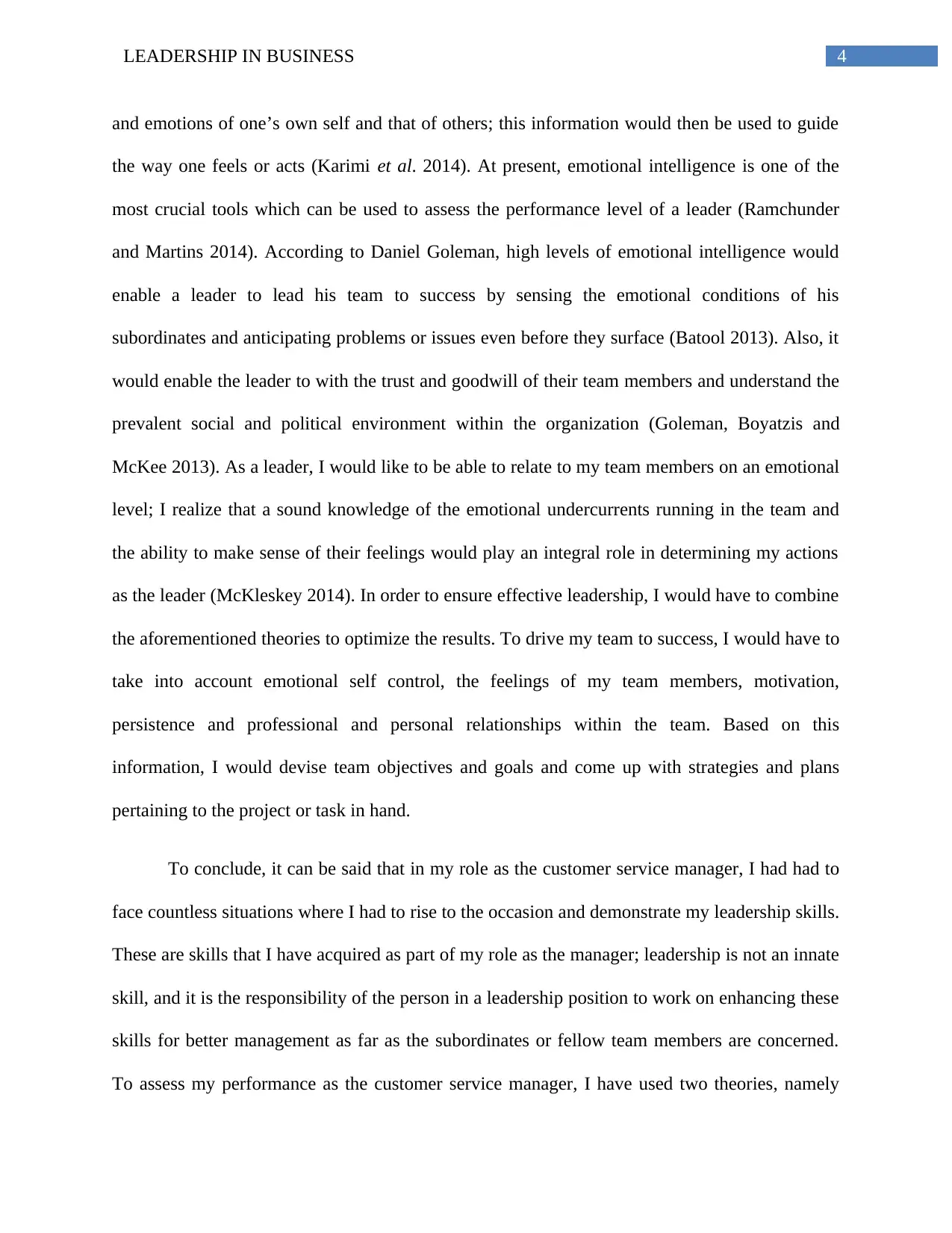
4LEADERSHIP IN BUSINESS
and emotions of one’s own self and that of others; this information would then be used to guide
the way one feels or acts (Karimi et al. 2014). At present, emotional intelligence is one of the
most crucial tools which can be used to assess the performance level of a leader (Ramchunder
and Martins 2014). According to Daniel Goleman, high levels of emotional intelligence would
enable a leader to lead his team to success by sensing the emotional conditions of his
subordinates and anticipating problems or issues even before they surface (Batool 2013). Also, it
would enable the leader to with the trust and goodwill of their team members and understand the
prevalent social and political environment within the organization (Goleman, Boyatzis and
McKee 2013). As a leader, I would like to be able to relate to my team members on an emotional
level; I realize that a sound knowledge of the emotional undercurrents running in the team and
the ability to make sense of their feelings would play an integral role in determining my actions
as the leader (McKleskey 2014). In order to ensure effective leadership, I would have to combine
the aforementioned theories to optimize the results. To drive my team to success, I would have to
take into account emotional self control, the feelings of my team members, motivation,
persistence and professional and personal relationships within the team. Based on this
information, I would devise team objectives and goals and come up with strategies and plans
pertaining to the project or task in hand.
To conclude, it can be said that in my role as the customer service manager, I had had to
face countless situations where I had to rise to the occasion and demonstrate my leadership skills.
These are skills that I have acquired as part of my role as the manager; leadership is not an innate
skill, and it is the responsibility of the person in a leadership position to work on enhancing these
skills for better management as far as the subordinates or fellow team members are concerned.
To assess my performance as the customer service manager, I have used two theories, namely
and emotions of one’s own self and that of others; this information would then be used to guide
the way one feels or acts (Karimi et al. 2014). At present, emotional intelligence is one of the
most crucial tools which can be used to assess the performance level of a leader (Ramchunder
and Martins 2014). According to Daniel Goleman, high levels of emotional intelligence would
enable a leader to lead his team to success by sensing the emotional conditions of his
subordinates and anticipating problems or issues even before they surface (Batool 2013). Also, it
would enable the leader to with the trust and goodwill of their team members and understand the
prevalent social and political environment within the organization (Goleman, Boyatzis and
McKee 2013). As a leader, I would like to be able to relate to my team members on an emotional
level; I realize that a sound knowledge of the emotional undercurrents running in the team and
the ability to make sense of their feelings would play an integral role in determining my actions
as the leader (McKleskey 2014). In order to ensure effective leadership, I would have to combine
the aforementioned theories to optimize the results. To drive my team to success, I would have to
take into account emotional self control, the feelings of my team members, motivation,
persistence and professional and personal relationships within the team. Based on this
information, I would devise team objectives and goals and come up with strategies and plans
pertaining to the project or task in hand.
To conclude, it can be said that in my role as the customer service manager, I had had to
face countless situations where I had to rise to the occasion and demonstrate my leadership skills.
These are skills that I have acquired as part of my role as the manager; leadership is not an innate
skill, and it is the responsibility of the person in a leadership position to work on enhancing these
skills for better management as far as the subordinates or fellow team members are concerned.
To assess my performance as the customer service manager, I have used two theories, namely
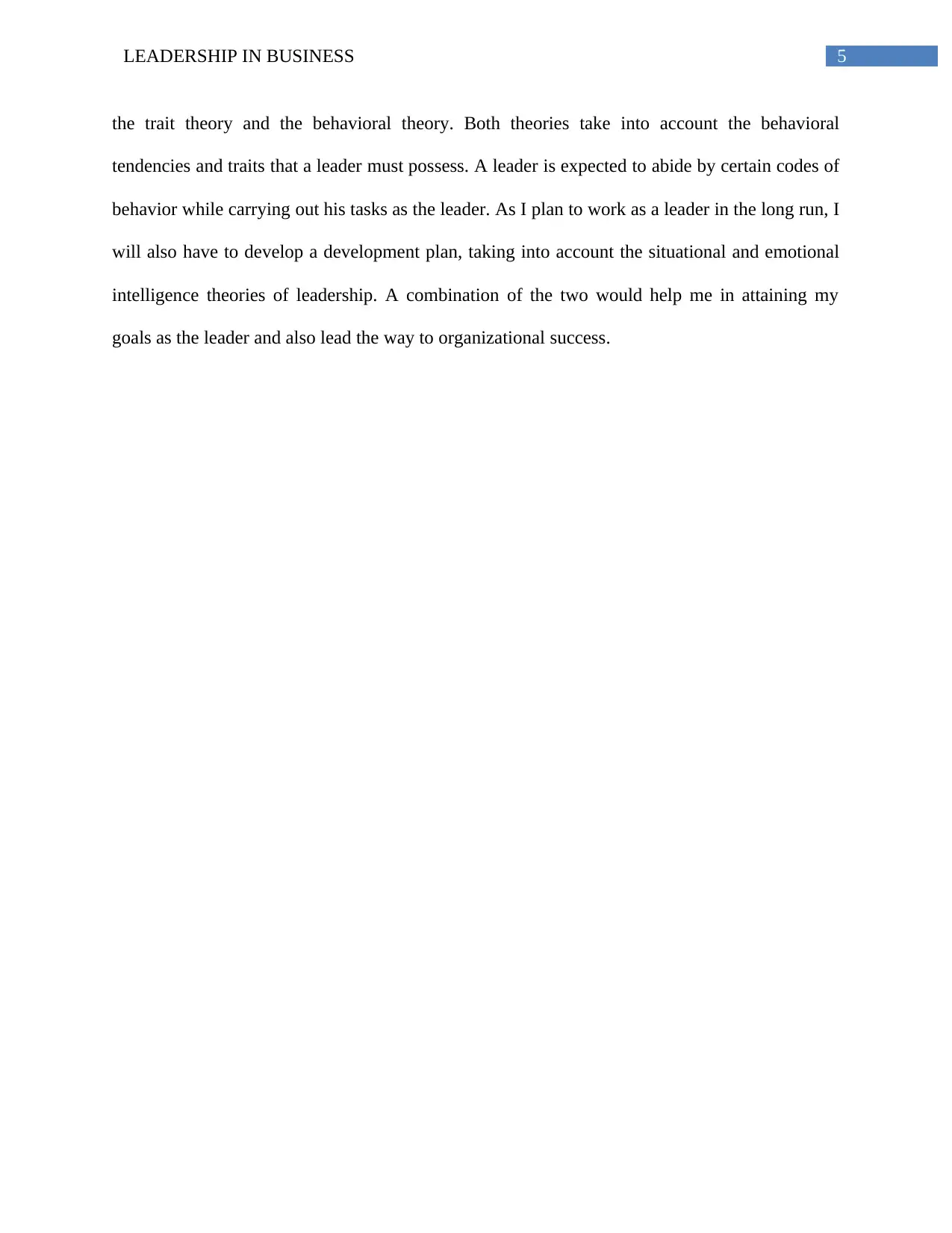
5LEADERSHIP IN BUSINESS
the trait theory and the behavioral theory. Both theories take into account the behavioral
tendencies and traits that a leader must possess. A leader is expected to abide by certain codes of
behavior while carrying out his tasks as the leader. As I plan to work as a leader in the long run, I
will also have to develop a development plan, taking into account the situational and emotional
intelligence theories of leadership. A combination of the two would help me in attaining my
goals as the leader and also lead the way to organizational success.
the trait theory and the behavioral theory. Both theories take into account the behavioral
tendencies and traits that a leader must possess. A leader is expected to abide by certain codes of
behavior while carrying out his tasks as the leader. As I plan to work as a leader in the long run, I
will also have to develop a development plan, taking into account the situational and emotional
intelligence theories of leadership. A combination of the two would help me in attaining my
goals as the leader and also lead the way to organizational success.
⊘ This is a preview!⊘
Do you want full access?
Subscribe today to unlock all pages.

Trusted by 1+ million students worldwide
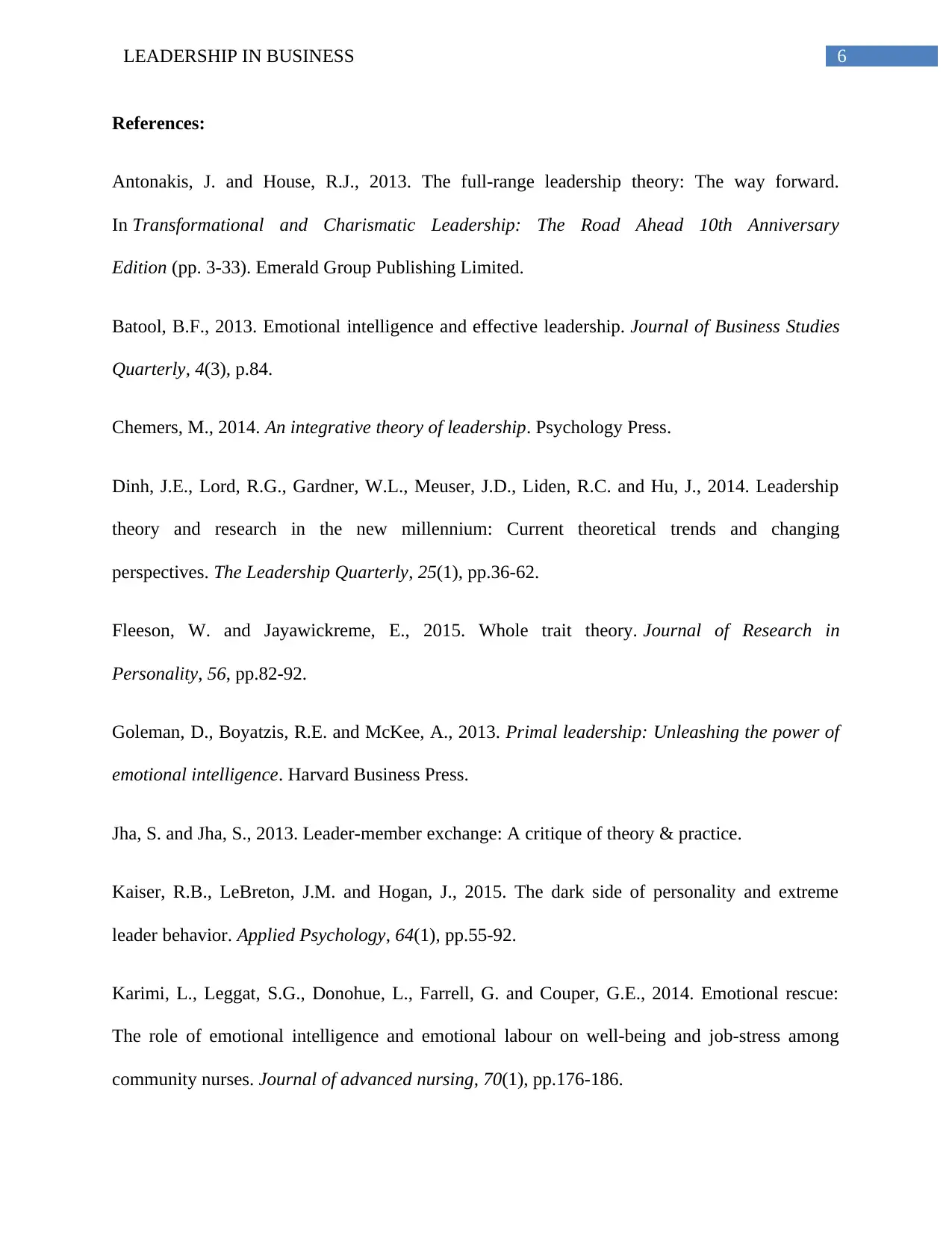
6LEADERSHIP IN BUSINESS
References:
Antonakis, J. and House, R.J., 2013. The full-range leadership theory: The way forward.
In Transformational and Charismatic Leadership: The Road Ahead 10th Anniversary
Edition (pp. 3-33). Emerald Group Publishing Limited.
Batool, B.F., 2013. Emotional intelligence and effective leadership. Journal of Business Studies
Quarterly, 4(3), p.84.
Chemers, M., 2014. An integrative theory of leadership. Psychology Press.
Dinh, J.E., Lord, R.G., Gardner, W.L., Meuser, J.D., Liden, R.C. and Hu, J., 2014. Leadership
theory and research in the new millennium: Current theoretical trends and changing
perspectives. The Leadership Quarterly, 25(1), pp.36-62.
Fleeson, W. and Jayawickreme, E., 2015. Whole trait theory. Journal of Research in
Personality, 56, pp.82-92.
Goleman, D., Boyatzis, R.E. and McKee, A., 2013. Primal leadership: Unleashing the power of
emotional intelligence. Harvard Business Press.
Jha, S. and Jha, S., 2013. Leader-member exchange: A critique of theory & practice.
Kaiser, R.B., LeBreton, J.M. and Hogan, J., 2015. The dark side of personality and extreme
leader behavior. Applied Psychology, 64(1), pp.55-92.
Karimi, L., Leggat, S.G., Donohue, L., Farrell, G. and Couper, G.E., 2014. Emotional rescue:
The role of emotional intelligence and emotional labour on well‐being and job‐stress among
community nurses. Journal of advanced nursing, 70(1), pp.176-186.
References:
Antonakis, J. and House, R.J., 2013. The full-range leadership theory: The way forward.
In Transformational and Charismatic Leadership: The Road Ahead 10th Anniversary
Edition (pp. 3-33). Emerald Group Publishing Limited.
Batool, B.F., 2013. Emotional intelligence and effective leadership. Journal of Business Studies
Quarterly, 4(3), p.84.
Chemers, M., 2014. An integrative theory of leadership. Psychology Press.
Dinh, J.E., Lord, R.G., Gardner, W.L., Meuser, J.D., Liden, R.C. and Hu, J., 2014. Leadership
theory and research in the new millennium: Current theoretical trends and changing
perspectives. The Leadership Quarterly, 25(1), pp.36-62.
Fleeson, W. and Jayawickreme, E., 2015. Whole trait theory. Journal of Research in
Personality, 56, pp.82-92.
Goleman, D., Boyatzis, R.E. and McKee, A., 2013. Primal leadership: Unleashing the power of
emotional intelligence. Harvard Business Press.
Jha, S. and Jha, S., 2013. Leader-member exchange: A critique of theory & practice.
Kaiser, R.B., LeBreton, J.M. and Hogan, J., 2015. The dark side of personality and extreme
leader behavior. Applied Psychology, 64(1), pp.55-92.
Karimi, L., Leggat, S.G., Donohue, L., Farrell, G. and Couper, G.E., 2014. Emotional rescue:
The role of emotional intelligence and emotional labour on well‐being and job‐stress among
community nurses. Journal of advanced nursing, 70(1), pp.176-186.
Paraphrase This Document
Need a fresh take? Get an instant paraphrase of this document with our AI Paraphraser
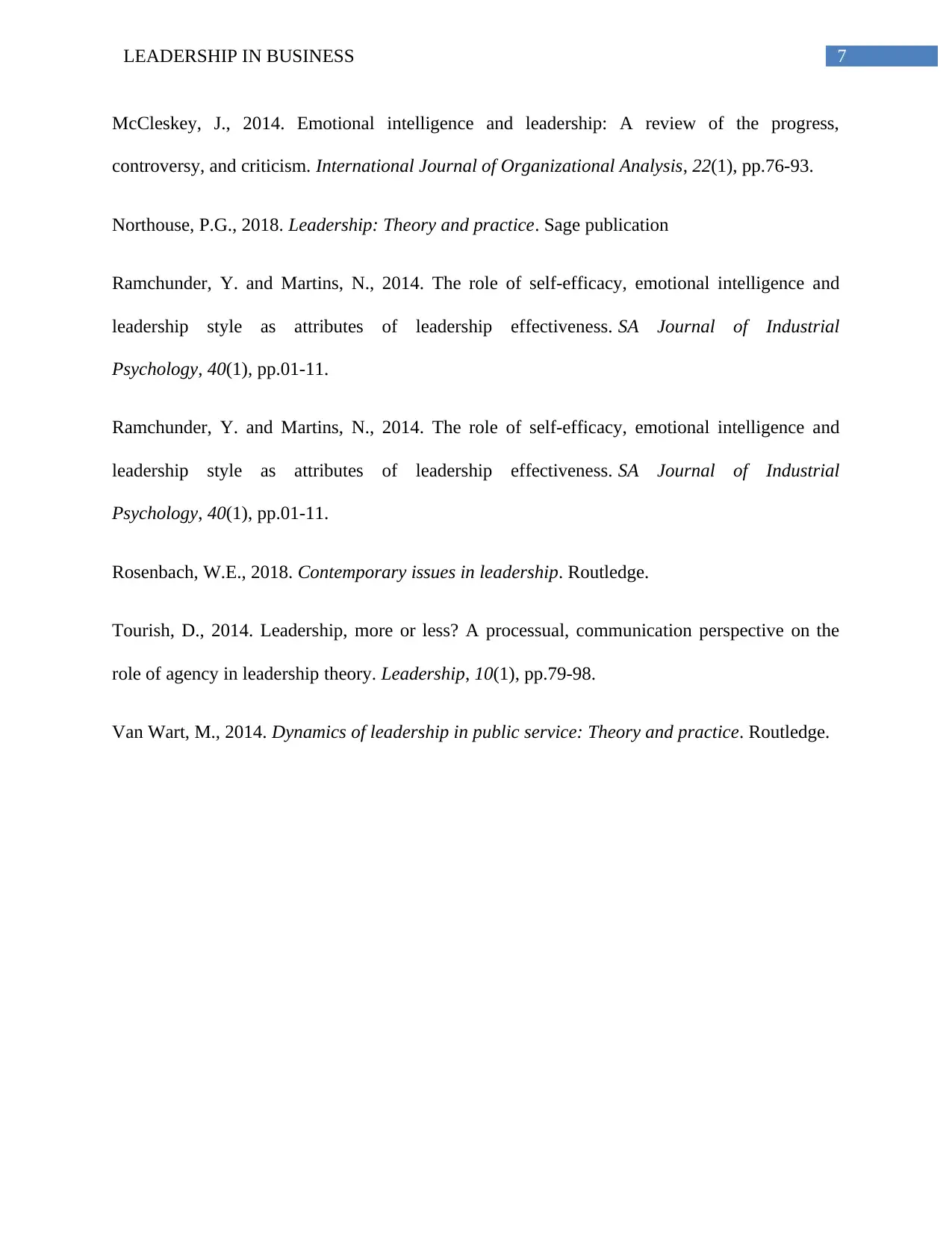
7LEADERSHIP IN BUSINESS
McCleskey, J., 2014. Emotional intelligence and leadership: A review of the progress,
controversy, and criticism. International Journal of Organizational Analysis, 22(1), pp.76-93.
Northouse, P.G., 2018. Leadership: Theory and practice. Sage publication
Ramchunder, Y. and Martins, N., 2014. The role of self-efficacy, emotional intelligence and
leadership style as attributes of leadership effectiveness. SA Journal of Industrial
Psychology, 40(1), pp.01-11.
Ramchunder, Y. and Martins, N., 2014. The role of self-efficacy, emotional intelligence and
leadership style as attributes of leadership effectiveness. SA Journal of Industrial
Psychology, 40(1), pp.01-11.
Rosenbach, W.E., 2018. Contemporary issues in leadership. Routledge.
Tourish, D., 2014. Leadership, more or less? A processual, communication perspective on the
role of agency in leadership theory. Leadership, 10(1), pp.79-98.
Van Wart, M., 2014. Dynamics of leadership in public service: Theory and practice. Routledge.
McCleskey, J., 2014. Emotional intelligence and leadership: A review of the progress,
controversy, and criticism. International Journal of Organizational Analysis, 22(1), pp.76-93.
Northouse, P.G., 2018. Leadership: Theory and practice. Sage publication
Ramchunder, Y. and Martins, N., 2014. The role of self-efficacy, emotional intelligence and
leadership style as attributes of leadership effectiveness. SA Journal of Industrial
Psychology, 40(1), pp.01-11.
Ramchunder, Y. and Martins, N., 2014. The role of self-efficacy, emotional intelligence and
leadership style as attributes of leadership effectiveness. SA Journal of Industrial
Psychology, 40(1), pp.01-11.
Rosenbach, W.E., 2018. Contemporary issues in leadership. Routledge.
Tourish, D., 2014. Leadership, more or less? A processual, communication perspective on the
role of agency in leadership theory. Leadership, 10(1), pp.79-98.
Van Wart, M., 2014. Dynamics of leadership in public service: Theory and practice. Routledge.
1 out of 8
Related Documents
Your All-in-One AI-Powered Toolkit for Academic Success.
+13062052269
info@desklib.com
Available 24*7 on WhatsApp / Email
![[object Object]](/_next/static/media/star-bottom.7253800d.svg)
Unlock your academic potential
Copyright © 2020–2026 A2Z Services. All Rights Reserved. Developed and managed by ZUCOL.




